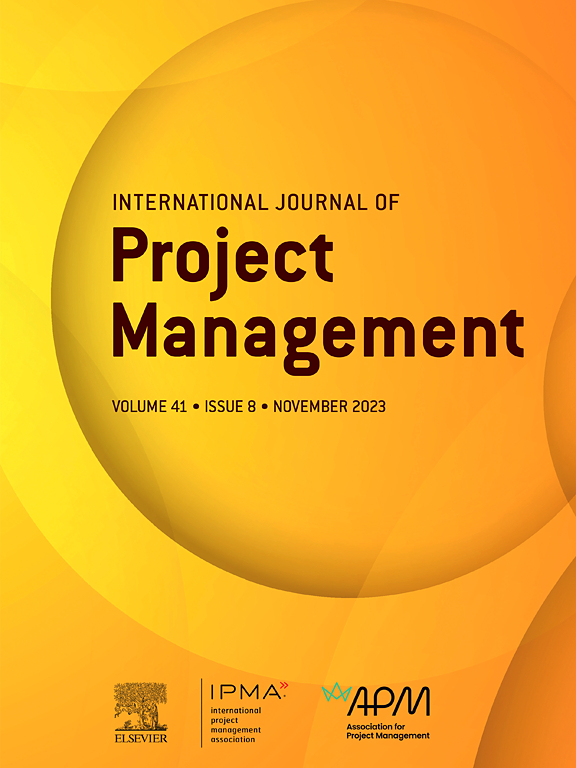An agency theory unpacking of how monitoring and evaluation affect international development project impact
IF 7.5
1区 管理学
Q1 MANAGEMENT
International Journal of Project Management
Pub Date : 2024-11-01
DOI:10.1016/j.ijproman.2024.102654
引用次数: 0
Abstract
Impact is the overarching objective of international development (ID) projects, yet many projects struggle to attain it. Both academic literature and practical experience highlight the importance of adequate monitoring and evaluation in ensuring ID project impact. There is, however, not enough theoretical clarity on what constitutes adequate monitoring and evaluation and the specific mechanisms through which monitoring and evaluation affect ID project impact. This study addresses this important literature gap by applying agency theory to conceptualise ID project impact. We propose that monitoring and evaluation are adequate when they resolve agency issues of goal incongruence and information asymmetry. We test this novel conceptualisation statistically by drawing on a sample of 200 survey responses from ID professionals working in Pakistan. The empirical results indicate that project monitoring resolves both goal incongruence and information asymmetry to influence ID project impact. Project evaluation resolved goal incongruence to affect ID project impact, but it had no effect on information asymmetry. This novel theory informed conceptualisation and empirical testing of adequate monitoring and evaluation that resolve agency issues to ensure ID project impact carry substantial implications for both theory and practice.
代理理论揭示了监测和评估如何影响国际发展项目的影响
影响是国际发展项目的首要目标,但许多项目难以实现这一目标。学术文献和实践经验都强调了充分监测和评价在确保身份证项目影响方面的重要性。但是,关于什么是适当的监测和评价,以及监测和评价通过哪些具体机制影响发展中国家项目的影响,在理论上还不够明确。本研究通过运用代理理论概念化ID项目影响来解决这一重要的文献空白。我们建议,当监测和评估解决了目标不一致和信息不对称的代理问题时,监测和评估是足够的。我们通过从巴基斯坦工作的ID专业人员中抽取200个调查回复样本,在统计上测试了这一新颖的概念。实证结果表明,项目监控解决了目标不一致和信息不对称对ID项目影响的影响。项目评价解决了目标不一致,影响了ID项目的影响,但对信息不对称没有影响。这一新颖的理论为充分监测和评估的概念化和实证测试提供了信息,这些监测和评估解决了机构问题,以确保ID项目的影响对理论和实践都具有重大意义。
本文章由计算机程序翻译,如有差异,请以英文原文为准。
求助全文
约1分钟内获得全文
求助全文
来源期刊

International Journal of Project Management
MANAGEMENT-
CiteScore
12.30
自引率
26.20%
发文量
83
审稿时长
59 days
期刊介绍:
The International Journal of Project Management is recognized as a premier publication in the field of project management and organization studies. Our main objective is to contribute to the advancement of project management and project organizing through the publication of groundbreaking research.
We are dedicated to presenting fresh insights and new knowledge in various domains, including project management, program management, portfolio management, project-oriented organizations, project networks, and project-oriented societies. We actively encourage submissions that explore project management and organizing from the perspectives of organizational behavior, strategy, supply chain management, technology, change management, innovation, and sustainability.
By publishing high-quality research articles and reviews, we strive to revolutionize the academic landscape and propel the field of project management forward. We invite researchers, scholars, and practitioners to contribute to our journal and be a part of the progressive development in this exciting field.
 求助内容:
求助内容: 应助结果提醒方式:
应助结果提醒方式:


